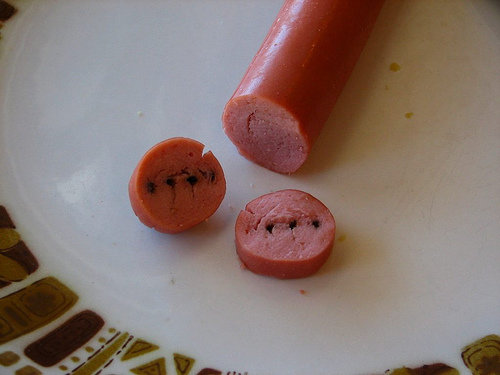One decision every mom has to make when she has a baby boy is whether or not to circumcise. It's a touchy subject (literally) and a very personal decision. In the 1970s and '80s, about 79 percent of baby boys were circumcised, but the trend in recent years has been to keep baby boys' foreskins "intact." According to the CDC, the circumcision rate in the U.S. in 2010 was down to about 55 percent. And Doctors Opposing Circumcision estimates that world-wide, 85 percent of men haven't been circumcised.
While some moms know right away what they'll do, others struggle with the circumcision decision. Below are some factors to consider when deciding whether or not to circumcise your son. Determine which ones are most important to you and that should help you make a choice.
Good luck!
Snip It! It Could Be Better for His Health

New research has shown that men who have a circumcision performed before their first sexual experience also have a 15 percent lower rate of prostate cancer than those who either had the procedure after their first sexual encounter or who are uncircumcised. In addition, studies have shown that circumcision reduces a man's risk of acquiring and transmitting AIDS.
Stop! It hurts!

Ouch! Circumcision can hurt your little one. A 1997 study had to be stopped because the babies were in so much pain during circumcision, it would have been unethical to continue. The researchers found that even the best, most common method of anesthesia available did not block the babies' pain. Not only were the babies hurting, but they had an increased risk of choking and difficulty breathing. (Up to 96 percent of babies circumcised in the United States receive no anesthesia.)
Snip It! Some Women Think the Sex Is Better

Anecdotal evidence suggests that sex with circumcised men is better. Studies done by actual scientists go both ways. One landmark study found that 85 percent of women who had experienced both circumcised and intact men preferred sex with intact men and are twice as likely to reach orgasm. Another study done on new moms of sons showed that the majority preferred circumcised penises when partaking in the sexual activities they were asked about.
Stop! Men Lose Sensitivity After Circumcision

A May 2013 study confirmed the importance of the foreskin for penile sensitivity, overall sexual satisfaction, and penile functioning. The study showed that a higher percentage of circumcised men experience discomfort or pain and unusual sensations as compared with the uncircumcised population. The study concluded that parents considering circumcision of their sons should be informed of the importance of the foreskin in male sexuality.
Snip It! Little Johnny Has to Look Like Dad

Lots of parents choose to circumcise because it's family tradition or they want their kid to "look like daddy." Others argue that can't really happen — daddy's penis is bigger and hairier. And of course parent/child bonding doesn't require a matching set of genitals. If you decide not to circumcise your son and he ever questions the difference, just tell him things were done differently when dad was born. But if you really want him to look like similar to dad down there when he grows up, go for it.
Stop! Men Should Make Their Own Decisions About Their Bodies

Because circumcision is such a big decision to make and involves injury to the body part of another person, lots of folks believe the choice is your son's to make when he grows up.
Snip It! It's Cleaner Without the Foreskin

According to Dr. Oz, uncircumcised boys are 10 times more likely to get an infection than those who are circumcised. Circumcised penises do not collect "white stuff" underneath the foreskin like an intact penis does.
Stop! Cleaning It Is Easy

Those in the know say keeping it clean is no big deal. It's really just one more area to wash in the shower. When your son is little, you can use soap and water and follow these tips for keeping an uncircumcised penis clean.
Snip It! Cost of Widespread Health Issues Is Too Great

Declining circumcision rates are said to be contributing to an increase in medical problems. This trend toward avoiding circumcision could be adding over $4 billion in U.S. health care costs.
Stop! Accidents Can Happen

A botched circumcision is rare but they do happen. There is a 1 to 3 percent chance of complications, which can include mild bleeding, adhesions, buried penis, and local infection at one end of the spectrum and injury to the penis — or even death — at the other end. (Over 100 newborns die each year in the U.S., mostly from loss of blood and infection.) In June 2013, a 5-year-old boy who suffered damage from his circumcision was awarded $1.3 million. The boy was just 12 hours old when the doctor who performed the procedure amputated the tip of his penis.
Snip It! It's Important to You for Religious Reasons

While many doctors say there is no medical benefit to circumcising your son, they do understand that some people still may choose to circumcise for religious or cultural reasons. This is a personal decision that only you can make.
Stop! Russell Crowe Will Come After You

There are activists who argue that circumcision is a "barbaric" act and liken it to female genital mutilation, which is done for cultural and religious reasons (and is called "circumcision" by supporters of the practice). Female genital mutilation has sparked worldwide outrage. In 2011, Russell Crowe famously tweeted that male circumcision was "stupid and barbaric," and added: "Who are you to correct nature? Is it real that GOD requires a donation of foreskin? Babies are perfect." (Crowe later apologized.)




